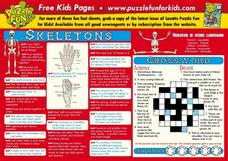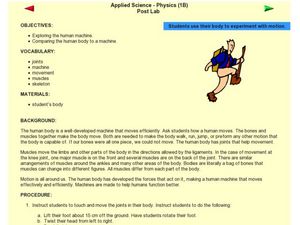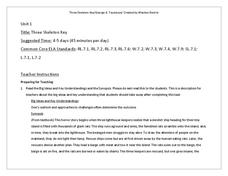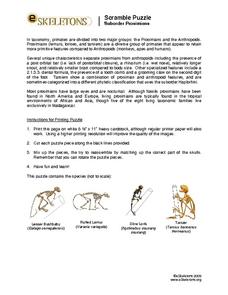Curated OER
Vertebrate Skeletons
In this biology worksheet, students examine the human skeleton and then classify animal bones according to their similar function.
Curated OER
Skeleton
Students study the skeleton. In this human body lesson, students draw and label bones in the body by tracing each other and creating a skeleton out of body parts and brass fastners.
Curated OER
The Human Body Lesson
Students identify features of the human body, explore needs of the human body by explaining the importance of good health in relationship to the body, and study functions and care of the human body and its organs.
Curated OER
Dinosaur Skeletons
Students investigate the anatomy of a dinosaur, describe its skeleton, and arrange pretend bones using toothpicks, popsicle sticks, tongue depressors, and a variety of wooden beads.
Curated OER
The Human Body
In this human body worksheet, 6th graders respond to 13 different questions related to parts of the human body. First, they determine how many times the heart beats a minute and the 2 types of blood vessels. Then, students describe the...
Curated OER
Skeletons
In this science worksheet, learners investigate the human skeletal system. Students read factual paragraphs with details about the bones in the human body and in some other species as well. Learners complete a crossword puzzle.
Curated OER
Human Machine
Students explore the human body by conducting an exercise in class. In this human anatomy lesson, students view a diagram of the human body and identify the specific bones and joints that allow us to perform specific exercises like...
Curated OER
Comparing Human and Avian Skeletons
For this human and avian skeleton review worksheet, students read about both skeletal systems and respond to 10 fill in the blank and drawing questions.
Curated OER
EXPLORING OUR HUMAN BODIES
Students observe and investigate the human skeletal and muscle systems. They become aware of the versatility of movement as well as gain experience through the use of diagrams and hands on activities. An extensive vocabulary is covered...
Curated OER
Bones Provide Great Support!
How do bones help people move around? A science investigation prompts kids to draw arrows to certain bones that protect their organs. After they finish, they trace their hands on a piece of paper and trace the way their bones go. Great...
Curated OER
The Human Body: Bones
Here is an interactive PowerPoint about the skeletal system. The first slide shows the entire skeleton and allows learners to try to name each major bone structure before clicking to show the answer. The following slides provide more...
Curated OER
Levers and Wedges in the Human Body
Young biologists identify parts of the body that serve as wedges (teeth and fingernails), and as levers (jaw, arms, and legs). The hands-on activities described here should be exciting for learners to perform, and should also lead to a...
Curated OER
Moving and Growing: The Human Body
In this human body worksheet, students identify the body parts on the skeleton: shoulder blade, skull, arm, backbone, wrist, hand bone, knee cap, upper leg bones, lower leg bones, and foot.
Curated OER
Moving and Growing
Learners explore the types of skeletons in various animals. In this skeletal systems lesson plan, students watch a video clip about skeletons, view a human skeleton, compare the skeletons of humans, chickens and fish, and learn about...
Curated OER
Can You Make a Muscle?
Why are muscles important? Third graders study the different kinds and functions of muscles in the human body. After drawing arrows in an illustration to indicate where a muscle contraction would occur, they do their own experiment about...
Curated OER
Three Dimensional Art of Vertebrates and Invertebrates
Young scholars, during this twelve week series of lessons, learn basic anatomy through life sketches of human skeletons and shells. They learn fundamentals of line and convey life through sketches learning science through art.
Curated OER
Studying Fossils
Students compare and contrast key skeletal differences between chimpanzees and humans: brain size, teeth, hand and thumb, trunk, pelvis, lower limb, foot and big toe. They then sort and group a set of mixed "fossil bones" of chimpanzee...
Washoe County School District
Three Skeleton Key
Conduct a close reading of George G. Toudouze's well-known horror story "Three Skeleton Key." This plan breaks up the reading into several steps and provides text-dependent questions to ask along the way. Learners will have the chance to...
eSkeletons
Skeleton Scramble Puzzle: Suborder Prosimians
Explore the finer details of primate skulls with these puzzles, incorporating advanced scientific analysis of two suborders- Prosimians and Anthropoidea- and one superfamily- Hominoidea. Learners read about the unique characteristics of...
Common Sense Press
What is the Skeletal System?
Students investigate the human skeletal system. For this biology lesson, students trace the outline of their body onto butcher paper and fill in the names of the bones. Students use an overhead transparency of the human skeletal system...
Curated OER
Human VS Animal Skeletons
Students research and compare human and animal skeletons. They identify human skeletons basic functions and parts.
Curated OER
Skeleton Puzzle
In this elementary science activity, students practice putting the six pieces of a puzzle together to create a picture of a human skeleton.
Curated OER
The Human Skeletal System: Inside and Out
Students study bone size, structure and shape. They use various geometrical shapes to make a skeleton and produce a poster depicting the skeletal system and its functions. They arrange the pictures into the five sections, glue on...
Curated OER
Human Anatomy- How Do We Move?
Students examine the muscular system. In this muscular system lesson, students first draw a realistic representation of their leg or arm bones. Students do several activities to attach these bones to "joints" with string to simulate the...

























